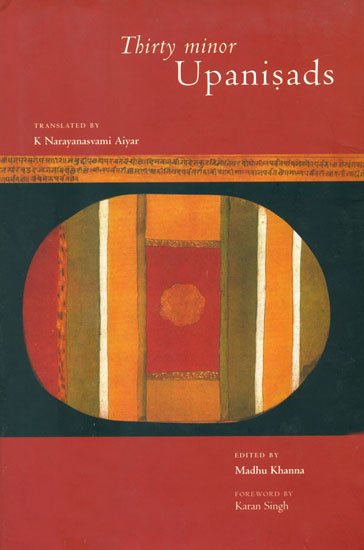Thirty minor Upanishads
by K. Narayanasvami Aiyar | 1914 | 95,228 words
This book contains the English translation of thirty minor Upanishads.—Fourteen belonging to Vedanta, two are categorised as Physiological, three are Mantra, two are Sannyasa and the remaining nine are categorised as Yoga-Upanishads. These Upanishads are properly defined as the Aranya-portion of the Vedas (most ancient Hindu scriptures) and are so-...
Varaha Upanishad of Krishna-Yajurveda, Chapter I
The great sage Ṛbhu performed penance for twelve deva (divine) years. At the end of the time, the Lord appeared before him in the form of a boar. He said: "Rise, rise and choose your boon." The sage got up and having prostrated himself before him said: "O Lord, I will not, in my dream, wish of thee those things that are desired by the worldly. All the Vedas, Śāstras, Itihāsas[1] and all the hosts of other sciences, as well as Brahma and all the other Devas, speak of emancipation as resulting from a knowledge of thy nature. So impart to me that science of Brahman which treats of thy nature."
Then the boar-shaped Bhagavān (Lord) said: "Some disputants hold that there are twenty-four tattvas (principles) and some thirty-six, whilst others maintain that there are ninety-six. I shall relate them in their order. Listen with an attentive mind. The organs of sense are five, viz.: ear, skin, eye and others. The organs of action are five, viz.: mouth, hand, leg and others. Prāṇas (vital airs) are five;[2] sound and others (viz., rudimentary principles) are five.[3] Manas, buddhi, citta and ahaṅkāra are four;[4] thus those that know Brahman know these to be the twenty-four tattvas. Besides these, the wise hold the quintuplicated elements to be five, viz.: earth, water, fire, vāyu and ākāś; the bodies to be three, viz.: the gross, the subtle and the kāraṇa or causal; the states of consciousness to be three, viz.: the waking, the dreaming and the dreamless sleeping. The munis know the total collection of tattvas to be thirty-six (coupled with jīva).
"With these tattvas, there are six changes, viz.: existence, birth, growth, transformation, decay and destruction. Hunger, thirst, grief, delusion, old age and death are said to be the six infirmities. Skin, blood, flesh, fat, marrow and bones are said to be the six sheaths. Passion, anger, avarice, delusion, pride and malice are the six kinds of foes. Viśva, Taijasa and Prājña[5] are the three aspects of the jīva. Sattva, rajas and tamas are the three guṇas (qualities). Prārabdha,[6] sañcita and āgāmin are the three karmas. Talking, lifting, walking, excreting and enjoying are the five actions (of the organs of action); and there are also thought, certainty, egoism, compassion, memory (functions of manas, etc.,), complacency, sympathy and indifference: dik (the quarters), Vāyu, Sun, Varuṇa,[7] Aśvini devas,[8] Agni, Indra, Upendra,[9] and Mṛtyu (death): and then the moon, the four-faced Brahma, Rudra, Kṣetrajña,[10] and Īśvara. Thus these are the ninety-six tattvas. Those that worship, with devotion, me of the form of boar, who am other than the aggregate of these tattvas and am without decay are released from ajñāna and its effects and become jīvanmuktas. Those that know these ninety-six tattvas will attain salvation in whatever order of life they may be, whether they have matted hair or are of shaven head or have (only) their tuft of hair on.[11] There is no doubt of this. Thus ends the first chapter."
Footnotes and references:
[1]:
Books such as Mahābhārata and Rāmāyaṇa.
[2]:
[4]:
Producing respectively uncertainty, certain knowledge, fluctuation of thought, and egoism and having certain centres in the body.
[5]:
In the states of waking, dreaming and dreamless sleeping.
[6]:
Being past karmas now being enjoyed, past karmas being in store to be enjoyed hereafter and the karmas now produced to be enjoyed hereafter.
